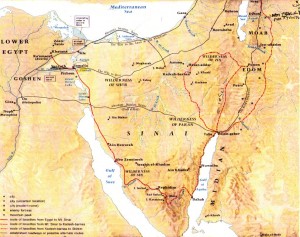A point often overlooked when we talk about Lent is its celebratory nature. Throughout the week we remember our complete need for healing, but doing so makes our rejoicing all the more honest. During the week we are reminded that without the Light we’re lost, but we remember that “Sunday’s a-comin’!” On Sunday we celebrate the resurrection. We celebrate the God who brings the dead to life and calls nonexistent things into existence.
But what might a celebration for partakers in the ‘kingdom of God’ look like today? What would it look like if, from the world over, members of the kingdom—the kingdom belonging to the Just and Holy, the Faithful and True—gathered under the same roof and celebrated their King? I’m reminded of worship at Urbana ’09. I’m reminded of the jubilant throng of men and women leaving the St. Louis stadium just after midnight on New Year’s Eve. Walking through the halls we celebrated in Kiswahili, singing “Hakuna Mungu Kama Wewe” (“There’s no God like you”). See videos of this here and here.
The stadium’s janitors and security looked on with curiosity. People exiting this stadium after a game or a show, no matter how magnificent, usually hurry to their cars and out of the CBD to escape the gridlock. But not these. Not the people who’ve just gathered 17,000 strong to celebrate this King.
That is how I imagine a celebration in the kingdom of God.
Sundays during Lent are for that kind of joy.
The opening prayer from the Catholic lectionary for Lent’s second Sunday (February 24th this year) reads as follows:
O God, who have commanded us to listen to your beloved Son, be pleased, we pray, to nourish us inwardly by your word, that, with spiritual sight made pure, we may rejoice to behold your glory. Through our Lord Jesus Christ, your Son, who lives and reigns with you in the unity of the Holy Spirit, one God, for ever and ever.
Like last week’s, this prayer reveals another aspect of the essence of Lent: God, through the events of Easter, has opened our eyes to rejoice in the glory of His Son, who lives and reigns forever.
After praying that simple prayer to the Father and putting yourself in His presence, take a few moments to read over this coming Sunday’s readings: Genesis 15:1-12, 17-18, Psalm 27, Philippians 3:17-4:1, and Luke 13:31-35 or Luke 9:28-36.
I’m going to focus here on Luke 9:28-36, which will be the Gospel reading in the Roman Catholic Church this Sunday (I’m not a “baptized Roman Catholic” but I think they have put together a marvelous lectionary).
Luke 9:28-36 is the account of Jesus’ transfiguration and his turning toward Jerusalem. Through several discussions this week, I have found that most people connect Jesus’ turning toward Jerusalem with the cross, representing his embrace of death for our sake. While death is certainly implicit in his turning toward Jerusalem, in this passage his focus is not on his death as sinner but on his ascension as King.
Looking at the Greek in this passage has been incredibly revealing. The KJV translates vv. 30-31 in this way:
And, behold, there talked with him two men, which were Moses and Elias: Who appeared in glory, and spake of his decease which he should accomplish at Jerusalem.
There’s a problem with “decease” here. It doesn’t say that in the Greek. The word is ἔξοδος. That’s “exodos.” Moses and Elijah spoke with Jesus about his exodus. In the Jewish world of the first century, under the oppressive rule of Tiberius Caesar, “exodus” was charged to the point of buzzing. Especially in conversations with Moses. Jesus was headed to Jerusalem to bring the exodus to fulfillment. To drive the point further, in 9:51 Luke tells us, “When the time had fully come for his ascension, Jesus firmly set his countenance toward entering Jerusalem.”
Notice that it doesn’t say, “when the time had come for his death/crucifixion/suffering...” Instead, the focus is on his ascension, his path to coronation. His re-entry into majesty with the Father is approaching and he’s headed for the City of David, for Zion, to complete the Exodus. But he stops to heal a boy, to drive out a demon, and to teach about the greatness of lowliness and God’s love for children. Luke’s Gospel is a story intended to illustrate what God is like as King. He is a King who, on his way to the cross for the salvation of the cosmos, makes time for the little boy. He is a King who dies the death of a pedophile, of a rapist, a murderer, a cheater, a liar, a manipulator, a lustful man, a gossip, so that on Sunday He rises and takes the key to those chains. He broke the power of evil, and He now lives as the Faithful and True Victor. And, therefore, so do you.
That is why 17,000 people gather in St. Louis every three years; that is why we celebrate on Sunday in Lent; that is why I love writing and translating Greek; That is why I am a Christian.
During this season of Lent don’t fast simply for the sake of tradition. Fast so that on Sunday you can celebrate honestly. Fast so that you remember your need for a King who stops on his coronation path to heal, drive evil away, love children, and teach about humility.
My wife and I live in South Hamilton, MA where I’m pursuing an MDiv at Gordon Conwell Theological Seminary and she’s serving as Intervarsity staff on campus at Northeastern University. I study Theology and History and Philosophy “as ends in themselves” (in the Aristotelian sense), as well as for a further, more complete end: a deeper understanding of my King and, thus, a more dynamic relationship with him.
I graduated this past spring (2013) with BA in Religious Studies (Hinduism and Buddhism concentration) and a minor in Classical Greek (Homeric/Ionic/Attic/Doric/Koine, appx. 8th BCE – 5th CE). The study of the ancient world in its original context and language fascinates me, especially that of the Early Christians, Ancient Jews and Hellenes.
For more of my writing, see my blog @ www.philotheology.com



Excellent post. Thank you for making the videos of Urbana worship and the exit hallway clickable and for doing the same with the Scripture texts. Love this content and truth and tone. This King of kings who takes time to heal the marginalized is also our soon and coming King, not just spiritually. And the transfiguration also prefigures such according to Peter in 2Peter 1 the last couple paragraphs. But I’ll just bet you are going to affirm this soon as well. Wonderful writing. Splendid source of meditation. There is no one like Jesus. So true and what a glorious statement! Thanks again, John.
Soon and coming indeed, and thank you for pointing out the 2 Peter 1 passage, something I had overlooked!